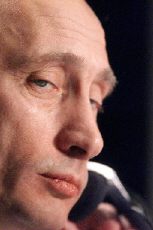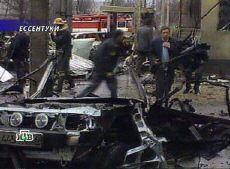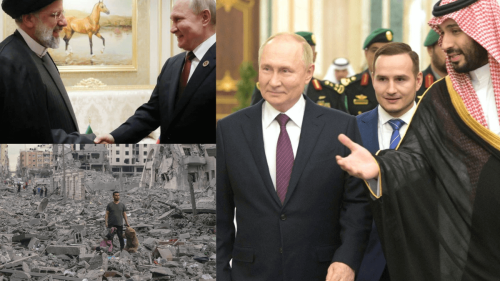Putin Preparing for More Fighting in Chechnya
Credit where credit is due: to the Chechen people, whose successful defiance of the Russian army's might has come to dominate the policies and activities of president Vladimir Putin and his aides in recent weeks, although he insists (with little credibility) that Moscow has won a resounding victory and will soon withdraw the Russian army. According to him, all that remains to be done in Chechnya is destroy the terrorists' outfits and rebuild the country. But the recent trips he and his aides have made to Europe, the radical reshuffle of the Russian cabinet and the structural changes made in the defense and security ministries, all suggest that he may be preparing for a new assault on an enemy that refuses to be defeated.

Russian President Vladimir Putin speaks during a press conference in March 2001 at the European Council summit in Stockholm. European leaders pressed Putin on Friday to reaffirm his commitment to democracy and peace in Chechnya in exchange for new loans and closer ties with the European Union. |
Putin demonstrated his obsession with the Chechen war when he addressed the European Union summit in Stockholm, Sweden, in late March, and harped on the situation in the devastated country, although he had been invited to the summit mainly to discuss economic and European issues. After reviewing how Moscow had won the war, he claimed that Russia has the only formula for dealing with the 'terrorists', which is to disarm and eliminate them. Naturally the former KGB agent and butcher of Chechnya did not refer to the massacres and mass graves that have been linked to the Russian army by western human-rights organizations and media.
A few days earlier, Sergei Yartrzhembsky, the Kremlin spokesman, was the Russian speaker at the annual meeting of the Trilateral Commission (consisting of delegates from Europe, North America and Japan) in London. His entire speech was devoted to only one subject: Chechnya. His object was to impress on the delegates the real danger that the Chechen 'terrorists' pose to the world. He described the Chechen leaders as "dreaming of imposing their will on the whole of the world". Yastrzhembsky then embarked on a long explanation of their plans to establish Islamic law in the entire Caucasus and then proceed to take Moscow, New York and Washington.
"It is particularly painful that the world community lacks in-depth understanding of the threats posed to it by international terrorism", said the Kremlin spokesman. Yartrzhembsky, who served for ten years under Boris Yeltsin, is now running a presidential information department to coordinate the press offices in all the ministries. He is famous among foreign journalists working in Moscow for the number of times that he has declared the Chechen war to be over and Russia to be victorious.
If indeed the Russians have won the war, why this degree of obsession with it on the part of the president and his aides? And how can one explain the presence of huge numbers of Russian troops in Chechnya and the daily casualties inflicted on them by Chechen fighters? The simple answer is that the war cannot be won, yet the Kremlin cannot afford to admit it. Hence the concoction of the threat of 'international terrorism' and 'religious extremism'.

A TV grab taken from the Russian NTV television channel shows police investigators working at the site of the 24 March 2001 explosion in the resort town of Yessentuki in the Stavropolsky region near Chechnya. |
The Chechens, for their part, believe that the Russians are able and willing to go to any length to 'prove' that the Chechen fighters are dangerous terrorists. The two bomb explosions that killed 23 people in late March in the southern region of Starrapol were blamed on the Chechen military leader Khattab, but they were more likely to be the work of Russian security.
The explosions took place soon after the US state department received the Chechen foreign minister Elias Akhanadov, a meeting that Moscow attacked as tactical support for terrorists. The Chechens had nothing to gain from the blasts, and have denied responsibility for them. Instead, they suggested that Russian agencies who were responsible for the apartment-building explosions in Russia in 1999 may also be responsible for the recent ones. No-one has so far been prosecuted for the explosions in 1999, which paved the way for the second Chechnya war and for Putin's election as president.
Putin has now given further signs that he is preparing for a third assault on Chechnya, only days after his trip to Stockholm and his aide's speech on the issue in London. Not only has he placed trusted aides in the security ministries, but he has also ordered a total overhaul of the Russian army -- which has previously failed to subdue the mujahideen in Afghanistan as well as the Chechens. The plan provides for the construction of a more mobile and combat-ready army, less dependent on nuclear capability, that can be deployed quickly along Russia's southern borders or in the Caucasus. Putin, who announced the changes and the military reconstruction plans during the cabinet reshuffle on March 28, admitted that the plans are a result of the war in Chechnya.
Putin has promoted Sergei Ivanov, secretary of the Russian security council and, like the president, a former KGB officer and native of St Petersburg, to be his minister of defense. Ivanov replaces Marshal Igor Sergeyev, who was removed because of his opposition to the restructuring of the military as demanded by his rival, Alexander Kvashin, the Chief of Staff. A number of Sergeyev's aides have also been removed; those close to Kvashin have been retained.
Putin has also removed Vladimir Rushailo, the interior minister, and replaced him with Boris Gryzlov, the head of the pro-Kremlin Unity Party, who is entirely dependent on the president. Rushailo is associated with the military failures in Chechnya because interior ministry troops do most of the fighting, while Gryzlov was closely associated with Putin's election ,as president, in, 2000. ,Gryzlov, who, was a busi,nessman and had no political and administrative experience, was suddenly promoted to leader of the Unity Party in 1999, when Putin was prime minister under Yeltsin. He immediately made it his main job to back Putin's presidential plans and the second Chechen war, which was waged to secure the Russian nationalist vote for those plans.
Despite this obvious obsession with the war and the apparent preparations for a third phase of it, Putin told the Russian parliament during his annual address on April 3 that the war was over and won, and that the army would be pulled out. Yet few in Russia -- or the West, which he tries to woo with references to democratic and economic reforms -- believe that the war in Chechnya, which has cost countless lives, really is over.
_______________________________________
This opinion piece was provided by the courtesy of the staff at Crescent International, a newsmagazine of the global Islamic movement.

















